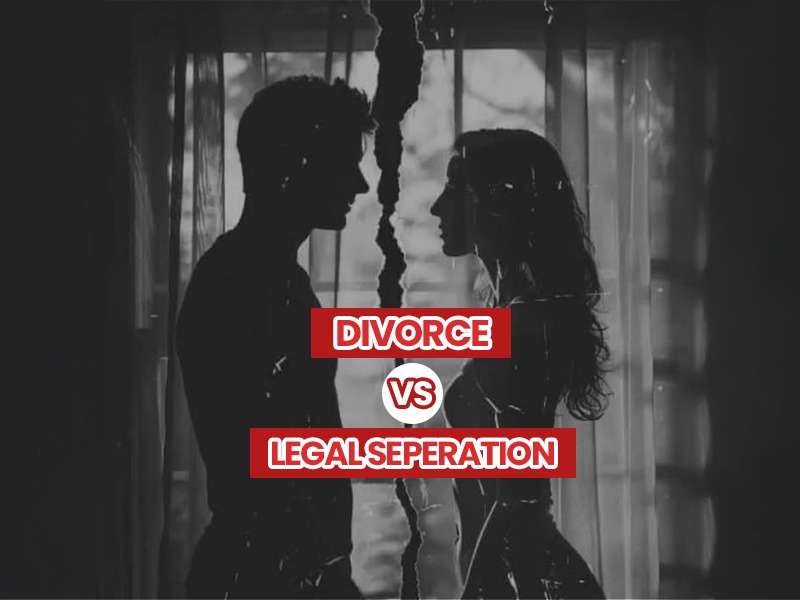When you’re facing challenges in your marriage, you may wonder whether to file for divorce or consider a legal separation. As a family law professional with years of experience, I’ve seen how confusing these terms can be for couples. This guide is written to give you clear, expert-backed, trustworthy information that helps you understand the difference, the pros and cons of each, and how to choose what’s right for you.
The difference between divorce and legal separation is simple:
- Divorce legally ends a marriage, allowing both partners to remarry.
- Legal separation allows couples to live apart with court-approved agreements (for finances, children, property) but they remain legally married.
What is Divorce?
Divorce is the legal dissolution of a marriage. Once the court grants a divorce:
- The marriage is officially ended.
- Both partners are considered single in legal terms.
- Either spouse can remarry.
- Property, assets, child custody, and spousal support are decided by the court (if not settled privately).
Key Features of Divorce:
- Permanent end to the marriage.
- Requires legal paperwork and court approval.
- Divides assets, debts, and responsibilities.
- Custody and child support orders are legally enforceable.
What is Legal Separation?
Legal separation is when a couple decides to live apart but remain legally married. The court issues an order that outlines:
- Living arrangements.
- Child custody and visitation rights.
- Division of finances and debts.
- Spousal or child support.
Key Features of Legal Separation:
- Marriage is not dissolved.
- Couples cannot remarry.
- Provides legal clarity while keeping marriage intact.
- Often used by couples who need time apart but do not want a final divorce.
Divorce vs. Legal Separation: Side-by-Side Comparison
| Factor | Divorce | Legal Separation |
| Marital Status | Ends marriage completely | Still legally married |
| Ability to Remarry | Yes | No |
| Property Division | Final division | Temporary division |
| Health Insurance | Usually lost | Often remains |
| Religious Beliefs | May conflict | Marriage technically intact |
| Tax Benefits | Cannot file jointly | May still file jointly |
| Reconciliation | Must remarry if reconciled | Can resume marriage |
| Finality | Permanent | Flexible |
Why Choose Divorce?
Couples may choose divorce if:
- They are certain the marriage cannot be repaired.
- They want the freedom to remarry.
- They prefer a final and clear settlement of property and finances.
- They want to move forward emotionally and legally.
Benefits of Divorce:
- Permanent closure.
- No future legal ties.
- Ability to build a new life, including remarriage.
Drawbacks of Divorce:
- Emotional strain.
- Potential conflict over assets or children.
- May conflict with personal or religious beliefs.
Why Choose Legal Separation?
Couples may choose legal separation if:
- They want to live apart but keep the marriage legally intact.
- Their religion or culture does not permit divorce.
- One spouse depends on the other’s health insurance.
- They are unsure about divorce and want time to decide.
Benefits of Legal Separation:
- Provides structure and legal protection without ending the marriage.
- May preserve financial and insurance benefits.
- Easier to reconcile if the couple decides to get back together.
Drawbacks of Legal Separation:
- Cannot remarry.
- Some legal obligations (like debts) may still apply.
- May only delay the decision if divorce is inevitable.
Key Legal and Emotional Considerations
1. Emotional Impact
- Divorce: Final and may bring closure, but also grief.
- Legal Separation: Provides space without ending the relationship fully.
2. Financial Impact
- Divorce divides assets permanently.
- Separation allows shared benefits like tax filing or insurance.
3. Religious & Cultural Beliefs
- Divorce may be discouraged or forbidden in certain faiths.
- Separation offers a compromise.
4. Children’s Well-being
- Both processes involve custody and support orders.
- Stability depends on how well parents cooperate.
When to Choose Divorce
Divorce may be the right option if:
- You are certain the marriage cannot be repaired.
- You want the freedom to remarry.
- You need a permanent financial and custody arrangement.
- Your religious or cultural background permits divorce.
When to Choose Legal Separation
Legal separation may be the right option if:
- You need time apart to decide.
- Your religion or culture discourages divorce.
- You want to keep health insurance or tax benefits.
- You may reconcile later, but need a structured arrangement now.
Legal Process Overview
- File a petition for divorce.
- Serve papers to the spouse.
- Court hearings for property, custody, and support.
- Final divorce decree.
Legal Separation Process
- File a petition for legal separation.
- The court issues orders for child custody, property, and support.
- Couples live apart under a legal agreement.
Frequently Asked Questions (FAQs)
1. Is legal separation the same as divorce?
No. Divorce ends the marriage permanently, while legal separation keeps the couple legally married but living apart.
2. Can I remarry if I’m legally separated?
No. You must be divorced to remarry.
3. Do both require court involvement?
Yes. Both divorce and legal separation require court approval to be legally binding.
4. Can legal separation be turned into divorce?
Yes. In many cases, couples later convert a separation into a divorce.
5. Which is better: divorce or legal separation?
It depends. If you want final closure, divorce is better. If you need time or want to preserve benefits, separation may work.

